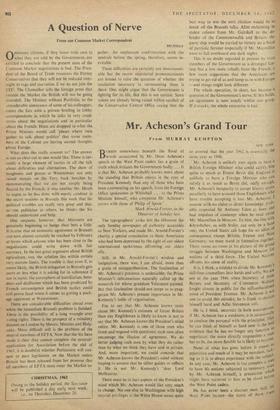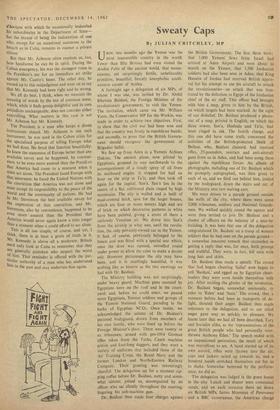Mr. Acheson's Grand Tour
F rom MURRAY KENIPTON
BURIED somewhere beneath the flood of words occasioned by Mr. Dean Acheson's speech to the West Point cadets lies a grain of
truth which irritates the Government badly.... It is that Mr. Acheson probably knows more about the standing that Britain enjoys in the eyes of President Kennedy than any of those who have been commenting on his speech, from the Foreign Office spokesmen in Whitehall . . to the Prime Minister himself, who compared Mr. Acheson's errors with those of Philip of Spain.'
Alark Arnold-Forster, in the Observer of Sunday last. The typographers' strike left the Observer the only Sunday newspaper of authority accessible to New Yorkers, and made Mr. Arnold-Forster's charity a special consolation to those Americans who had been depressed by the sight of our oldest international spokesman affronting our oldest ally.
Still, in Mr. Arnold-Forster's wisdom and resignation, there was, I am afraid, more than a grain of misapprehension. The fascination of Mr. Acheson's presence is undeniable; the Prime Minister's subconscious naturally called up the monarch for whose grandson Velasquez painted. But that fascination should not tempt us to exag- gerate Mr. Acheson's present importance in Mr. Kennedy's table of organisation.
For to say that Mr. Acheson knows more about Mr. Kennedy's estimate of Great Britain than any Englishman is likely to know is not to say that Mr. Acheson knows the President's mind entire. Mr. Kennedy is one of those men who listen and respond with questions; such men often encourage the illusion of agreement. We do better judging such men by what they do rather than by what we think they have said in private. And, more important, we could concede that Mr. Acheson knows the President's mind without leaping to assume that he either guides or reflects it. He is not Mr. Kennedy's 'dear Lord Melbourne.'
There must be in fact aspects of the President's mind which Mr. Acheson would like very much to change. No one else in Washington with high tutorial privileges at the White House seems quite so assured that the year 1962 is esseNnr:NiNa.111;':e same year as 1946.
Mr. Acheson is unlikely ever again to have 3 British Foreign Minister who could satisfy ilia'
quite so much as Ernest Bevin did. England is
unlikely to have a Foreign Minister who can satisfy it as much as Bevin .did; oddly enough, Mr. Acheson's incapacity to accept history seenls peculiarly to have aroused those Englishmen who have trouble accepting it too. Mr. Acheson, I assume with no claim to direct knowledge. prob- ably respected Sir Anthony Eden at Suez and had impulses of contempt when he read ab"nt Mr. Macmillan in Moscow. To him, the line with Khrushchev, as with Stalin, can only be a hard one; the United States caii hope for no allies of consequence except Britain, France and West Germany; we must stand in formation together. There seems no room in his picture of the grand struggle between Washington and Moscow far notions of a third force. The United Nalii'ns affronts his sense of reality. It is, I think, a mistake to divide Mr. KennedY.s full-time counsellors into hards and sons. We are not in the year 1946 when Secretary of state Byrnes and Secretary of Commerce Wallacl fought almost in public for the still-unharden" mind of President Truman. Mr. Acheson is 1-Wt one to avoid this mistake; he is frank to declare himself hard and Adlai Stevenson soft.
He is, I think, incorrect in both assumptions; if Mr. Acheson has a weakness, it is occasionall): to confuse the personal with the principled. That' he can think of himself as hard now is the bes. evidence that he has no longer any function a' negotiator; the more directly responsible a plan has to be, the more flexible he is likely to beconle' None of what has gone before is meant as pejorative and much of it may be mistaken. lackt: ing as it is in direct experience with the sill/ie.% In any case, Mr. Acheson is too complex a ill% to have his notions subjected to summary. eveb by Mr. Acheson himself, a precaution whic.. might have occurred to him as he stood befor` the West Point cadets. He has never been a discreet man. Still. his fours
West Point lecture—the latest of those d'horizon with which he occasionally bedazzled his subordinates in the Department of State— has the excuse of being the indiscretion of one Who, except for an occasional summons to the breach as in Cuba, remains in essence a private citizen.
But then Mr. Acheson often reminds us, too, how handsome he can be in spirit. During the Cuban emergency, his was the strongest voice in the President's ear for an immediate air strike against Mr. Castro's bases. The other day, he owned up to this misjudgment and went on to say that Mr. Kennedy had been right and he wrong.
We all do best, I think, when we measure the meaning of words by the test of common sense, Which, while it finds gossip delightful and its own prejudices unchangeable, does not consider either controlling. What matters in this case is not Mr. Acheson but Mr. Kennedy.
The President is a man who keeps a dozen instruments shined. Mr. Acheson is one such instrument; he was used in the Cuban crisis for the specialised purpose of telling Europe what we had done. He fitted that function beautifully; he knew the statesmen of Europe better than any available envoy and he happened, by conveni- ence, to be even more assured than the Presidmt that America had come to a moment when it Must act alone. The President faced Europe with that assurance; he faced the United Nations with the conviction that America was not alone and must accept its responsibility to the peace of the World and the community of nations. He had in Mr. Stevenson the best available envoy for the expression of that conviction, and Mr. Stevenson, also by convenience, happened to be even more assured than the President that America would never again know a time longer than a moment when it could afford to act alone.
This is
think there is too simple, of course, and yet, I
e is at least a grain of truth in it. Mr. Kennedy is above all a moderate; Britain need only look at Cuba to remember that they are generally mistaken who suspect the worst of him. That reminder is offered with the par- ticular authority of a man who has underrated him in the past and may underrate him again.



































 Previous page
Previous page